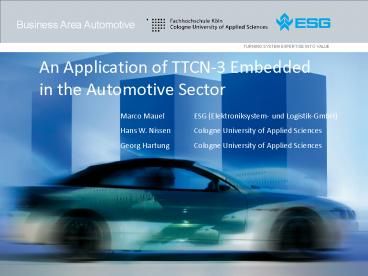Folie 1 PowerPoint PPT Presentation
Title: Folie 1
1
Business Area Automotive
TURNING SYSTEM EXPERTISE INTO VALUE
An Application of TTCN-3 Embedded in the
Automotive Sector
Marco Mauel ESG (Elektroniksystem- und
Logistik-GmbH) Hans W. Nissen Cologne University
of Applied Sciences Georg Hartung Cologne
University of Applied Sciences
2
Outline of Presentation
- Background and Motivation
- Some Important Features of TTCN-3 embedded
- Testsystem Setup
- Test Cases
- Conclusions Future Work
2
3
ESG - Turning system expertise into value
Company objectives
Portfolio Elements
- Consulting
- System development Embedded
- System development IT
- Logistics
- Training
- Lifecycle Services
- IT-Services
- Over 40 years ESG is the leading, internationally
operating system and software house for
development and service processes of software
intensive, complex, technically advanced, and
security critical products. - Customers Aerospace Defence, Automotive,
Logistics, Telecommunication
Unique Characteristics
Facts and Figures
- 1963 Foundation of the company
- 1.500 employees with 227 Mio turnover
- Shareholder EADS Deutschland GmbH, Rohde
Schwarz GmbH KG, Thales Defence Deutschland
GmbH, Litef GmbH - gt20 sites in Germany, France, USA
- Shareholdings ACS, ESG Automotive Inc., ESG
France SAS, ESG Consulting GmbH, ServiceXpert
GmbH, etc.
- Over 40 years experience in successful
implementation of major projects - System and Integration Competence
- ESG-wide centers of competence ensure extensive
knowledge sharing on state of the art future
technologies - Know how transfer between the business areas of
Technologies, Methods and Processes
3
4
Background and Motivation
- Integration and System test in automotive area
- Mainly performed manually
- Problems with standard TTCN-3 in embedded
environment - No timestamps of received Messages
- No possibility to evaluate continuous behavior
- No direct ability to evaluate datastreams, or
analog outputs - Stimulation of analog inputs very uncomfortable
- Test of complex behaviour like automatons is
difficult - Goal Set-up of testsystem for functional tests
in automotive area - Development of TTCN-3 Testsuite, System Adapter
and CoDec for CAN-based embedded Systems to test
diagnostic applications and message based
communication - TTWorkbench with CAN-Systemadapter and -CoDec
- CTTCN-3 Testsystem with ability to test stream
based communication, stimulate analog inputs and
evaluate analog outputs - Adapter for CANoe environment provided from
Fraunhofen Fokus (enables value injection into
environment variables) - Appropriate simulation of signals have to be
programmed in CAPL(e.g. reaction on value changes
in environment variables or additional needed
signals)
5
Some Important Features of TTCN-3 embedded
- Very short overview - more details in subsequent
presentation given by Mr. Großmann - TTCN-3 embedded 2 parts
- Real-time concepts RT TTCN-3
- Continuous concepts CTTCN-3
- RT TTCN-3
- Time measurement var float ts now
- Delay of execution wait(now 20)
- Access to enqueue time of a message
- myport.receive(msg) -gt timestamp myStampVar
- Verification of enqueue time
- if (myStampVar ts gt 10) setverdict(fail)
5
6
Some Important Features of TTCN-3 embedded
(contd)
- CTTCN-3
- streams, stream ports flow of data over time
- Read/Write Access .value, .timestamp, .delta
- Navigation .prev(index), .at(timevalue)
- State machines modes and transitions
- Different kinds of modes
- cont continuous execution of TTCN-3 statements
- seq sequential combination of modes
- par parallel combination of modes
- Transitions untilduration gt 2.0 statements
- Guards tell when to exit a mode optional
execution of statements in action block - Invariants inv boolean_condition
- Leave mode when invariant is hurt optional
execution of statements in action block - Assertions assert boolean_condition
- set fail verdict when hurt
6
7
Testsystem Setup
Used Software prel. CTTCN-3 editor and compiler
from Fraunhofer FOKUS (Eclipse IDE based)
Visual Studio ( System Adapter, CoDec )
Vector CANoe ( Hardware Communication, Simulation
) Used Hardware Vector CANCard XL (
CAN-Communication) Vector CAN Extender ( 8
digital I/Os, 4 analog outputs, 8 analog inputs)
HS-CAN
LS-CAN
I/O
8
Test caseAmbient light
type port StreamIn stream in float type port
StreamOut stream out float type component
ambientLightTest port StreamOut EnvSwitchLight
port StreamOut EnvIgnSwitch port StreamOut
ambientLight port StreamIn EnvHeadlight
testcase DayNightTransition() runs on
ambientLightTest EnvIgnSwitch.value
1.0 EnvSwitchLight.value3.0 ambientLight.value
5.0 seq cont ambientLight.value
ambientLight.value-0.2 until
EnvHeadlight.value1.0 assert(ambientLight.v
aluelt2.0) cont
ambientLight.value ambientLight.value 0.2
until EnvHeadlight.value0.0 a
ssert(ambientLight.valuegt3.0) EnvIgnSwitch.va
lue 0.0 EnvSwitchLight.value0.0 ambientLight
.value0.0
8
9
Test caseDI Cycle Test
type component extLightTest port
StreamOut EnvDISwitchRight port
StreamIn EnvDIRight mode DICycleTest(float
onTimeMax, float onTimeMin,float offTimeMax,
float offTimeMin, float testDuration)
runs on extLightTest
seq cont InitOn EnvDISwitchRight.value
1.0 untilEnvDIRight.value0.0 cont
InitOff untilEnvDIRight.value
1.0 cont DIOn untilEnvDIRight.value
0.0 assert(durationgtonTimeMin)
assert(durationltonTimeMax) cont
DIOff untilEnvDIRight.value1.
0 assert(durationgtoffTimeMin)
assert(durationltoffTimeMax) goto DIOn
untildurationgttestDuration
EnvDISwitchRight.value0.0
setverdict(pass)
Init On /EnvDISwitchRight.value 1.0
EnvDIRight.value0.0/
Init Off
durationgttestDuration /EnvDISwitchRight.value0
.0setverdict(pass)
EnvDIRight.value 1.0/
DIOn
EnvDIRight.value 1.0 /assert
(durationgtOffTimeMin)assert(durationltOffTimeMax
)
EnvDIRight.value 0.0 /assert
(durationgtOnTimeMin)assert(durationltOnTimeMax
DIOff
10
Test caseDI Cycle Test(contd)
11
Conclusions Future Work
- Conclusions
- TTCN-3 embedded is suitable to validate embedded
systems - automatons and datastreams are valuable and easy
to use - Prel. Compiler does not support complete set of
instructions - Test-setup was sufficient to validate functions
in Body-/Comfort-area - faster I/O connections required to validate
powertrain requirements - Some delays have been observed due to several
reasons - A/D-conversion times including value transmitting
via CAN - CAN-message cycle times in simulations (one cycle
time worst case) - maybe related to prel. CTTCN-3 environment
- Exact performance evaluation requires stable
environment - Future Work
- Setup with faster I/O connections
- More (complex) test cases when stable environment
available

